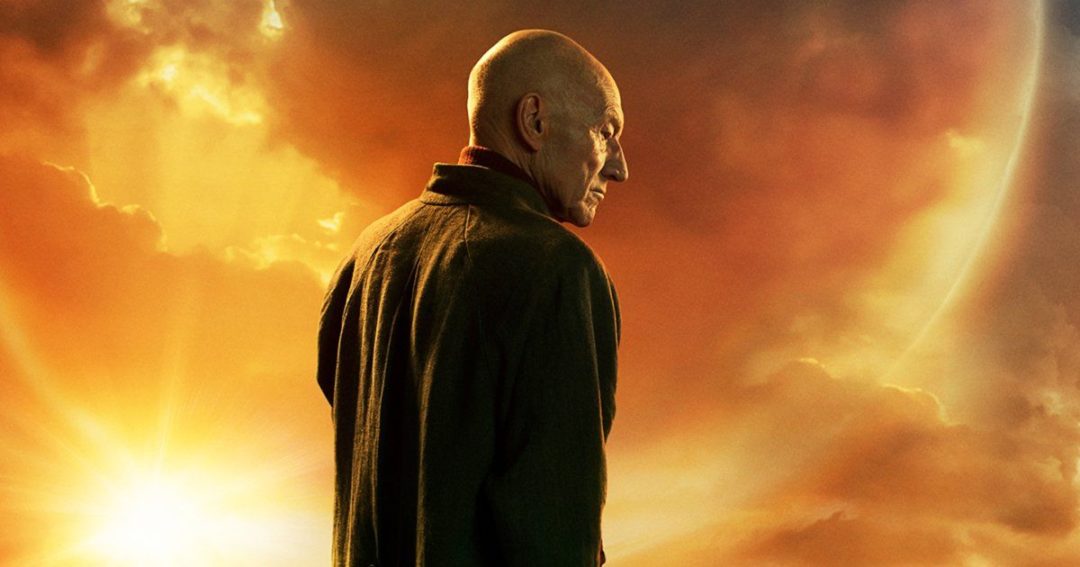The first full-length trailer for Star Trek: Picard dropped at San Diego Comic-Con this weekend. The show stars Patrick Stewart, reprising the role of Jean-Luc Picard from Star Trek: The Next Generation.
An exercise in nostalgia, Picard will be the first Star Trek show without an original lead character. Paradoxically, it will also be the first Star Trek television series to push beyond the established boundaries of the franchise’s future. Star Trek: The Next Generation takes place approximately a century after the adventures of Kirk and his crew in the original Star Trek. Later series like Star Trek: Deep Space Nine and Voyager unfolded within real time. From the first episode of The Next Generation to the final episode of Star Trek: Voyager, 14 years passed both for the audience and for the fictional universe.
The franchise’s progression seemed to come to an end in the early years of the 21st century. Following the end of Star Trek: Voyager, the production team decided to focus on a prequel to the original Star Trek, jumping back from the 24th century into the 21st century for Star Trek: Enterprise. Chronologically speaking, the Voyager finale “Endgame” was the last Star Trek episode of the era overseen by producer Rick Berman. Starting with the Enterprise pilot “Broken Bow” in Sept. 2001, the Star Trek franchise disappeared into its own history.
This was literalized within the film franchise. Released in December 2002, Star Trek: Nemesis was the fourth film to star the cast of The Next Generation. It was also a massive flop. Set in the year 2379, it was the last Star Trek film Berman produced. Seven years later, J.J. directed a soft reboot of the film franchise with Star Trek, where a supernova destroys the planet Romulus and time-traveling Romulans kill Kirk’s father, creating a new timeline for the cast of the original Star Trek series. As with the jump from Voyager to Enterprise, the time travel within Star Trek seemed to argue that the franchise’s future lay in its past.
The Star Trek universe is complicated by time travel and other gimmicks. There are technically episodes of Star Trek that unfold further in the future than “Endgame” or Nemesis. Due to a clever framing device, “Living Witness,” a fourth season highlight of Voyager, has the distinction of being the latest episode of the Berman era, chronologically speaking. But the obsession with the show’s past can arguably be traced back to its 30th anniversary in 1996, where episodes like “Trials and Tribble-ations” and “Flashback” dropped the new casts into classic adventures and First Contact took Picard back to the franchise’s origin.
The latest Star Trek show, Star Trek: Discovery, is also a prequel set before the events of the original Star Trek series. Creator Bryan Fuller departed Discovery very early in production, but he had suggested that he originally envisaged Discovery as an anthology series that would jump through time to effectively catch up with the franchise’s future. There are some hints of this within the show itself. “Calypso,” an episode of the Discovery companion series Star Trek: Short Treks, unfolded on an abandoned version of the title ship in the 23rd century, jumping further into the future than any previous episode of Star Trek to that point. Discovery also threw its crew into an unknown future at the end of its second season.

The first season of Picard will air before the third season of Discovery, giving it the responsibility of outlining a new future for the Star Trek franchise beyond the boundaries established by the Berman era. It seems strangely appropriate that Stewart should be the one to do it, since he first brought Star Trek viewers into the 24th century with Star Trek: The Next Generation‘s pilot, “Encounter at Farpoint,” on Sept. 28, 1987. Picard is set in 2399, two decades after the events of Nemesis, just shy of propelling the character into the 25th century. The future is beckoning, but it has not yet arrived.
The Picard trailer invites audiences to imagine what the future of the Star Trek universe might look like, but its biggest surprises are all tied to the franchise’s history. The death of Commander Data in Nemesis will play a big role in the series, although actor Brent Spiner will be back. The Borg and Romulans are playing a major role in the series, and Jeri Ryan will be reprising her role from Voyager as the former Borg Seven of Nine.
But the most remarkable thing about the trailer might be what it doesn’t show. It avoids deep cuts of Star Trek lore, in-jokes, or references. Irumodic Syndrome — the degenerative disease Picard was diagnosed with in The Next Generation finale “All Good Things…” — is never mentioned. Although the return of Picard’s former crew members William T. Riker and Deanna Troi was confirmed at SDCC, the trailer does not allude to either of them or their ship, the USS Titan. The trailer is reassuringly broad, offering a very general and accessible view of the Berman era. This is not a series aimed at die-hard Star Trek fans who intricately chart the franchise’s minutiae, but instead at the broader audience who remembers The Next Generation as a pop cultural phenomenon.

The Next Generation succeeded in a way that no other Star Trek series — including the original — could claim to be. Part of this was because the series aired in syndication, and part of it was timing. The Next Generation aired during an era where prime time science fiction was an oddity and a Frenchman with a British accent could corner the market. It regularly drew between 10 and 15 million viewers during its run, with 31 million tuning in for the finale. By the end of its run, Voyager was down to around five million viewers on average, with only eight million people tuning in for the finale; that was halved again for Enterprise, with just four million viewers watching its finale.
The Next Generation also had a broader impact on popular culture that cannot be easily quantified. President Ronald Reagan visited the set during the production of “Redemption,” the series’s 100th episode. The final season of The Next Generation was the first syndicated series to be nominated for the Outstanding Drama Series award at the Primetime Emmy Awards, an event so rare that its younger sibling Deep Space Nine affectionately spoofed it in the episode “Prophet Motive.” It’s still cited in articles about genre shows performing well at the awards show. Deep Space Nine, Voyager, Enterprise, and the original Star Trek were cult television shows. The Next Generation was a mainstream hit.
The trailer for Picard is very much aimed at the audience that has a broad — rather than specific — memory of The Next Generation. It leans heavily on the character of Data, perhaps the only other Next Generation character with a similar cultural cachet to Picard himself. (Worf is the only other viable contender, but he got enough screen time on Deep Space Nine.) Similarly, the emphasis on the Borg appeals to casual audiences. Star Trek fans might be tired of the Borg following years of diminishing returns on Voyager. But casual audiences have only seen the highlights, which included a summer cliffhanger so iconic that Family Guy shamelessly riffed on it for the cliffhanger of “Stewie Kills Lois,” and First Contact, the most critically and commercially successful movie starring The Next Generation cast. (Notably, the Borg dominate Netflix’s list of most-watched Star Trek episodes.)

Even the inclusion of Seven of Nine rather than The Next Generation characters like Riker or Troi seems like an appeal to general audiences. Seven of Nine is a controversial figure to hardcore Star Trek fans — and even cast members — because Voyager was restructured around her. But beyond Enterprise captain Scott Bakula and Voyager star Kate Mulgrew, Ryan might be the post-The Next Generation cast member with the largest cultural footprint outside the franchise.
The Star Trek franchise cannot survive by appealing to the same core audience that watched Voyager and Enterprise. It has to find a way to appeal to a broader demographic. There is some evidence that this is already working. Discovery co-creator Alex Kurtzman has outlined plans for a broad slate of Star Trek programming that will transcend genre and format. Star Trek: Lower Decks will be a half-hour animated comedy. There is an as-yet-unnamed animated series being targeted at children. Although the established fanbase has been somewhat divided on Discovery, it has been successful in drawing new fans to the franchise.
The first season of Discovery was the most popular streaming show in the United Kingdom and the United States in June 2018. Internationally, it was one of Netflix’s most popular offerings for families. The second season was the most popular streaming show in the world in April 2019. Now Picard might continue to build the next generation of Star Trek viewers.






Published: Jul 22, 2019 02:44 pm